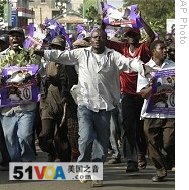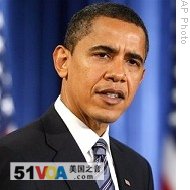Johannesburg
08 January 2009
 |
| Kenyans in Kisumu, Kenya, celebrate the victory of Barack Obama in US presidential election, 05 Nov 2008 |
Millions of members of the African diaspora stayed up all night, like many people in America, to cheer when Barack Obama was declared the next president of the United States.
A professor at Johannesburg's Witwatersrand University, Veronique Tadjo, says for people with African ancestry it was an emotional as well as historic moment.
"Obama has brought a big hope and has changed a lot of things for a lot of people in terms of how they view themselves. A black man becoming the most powerful man on the planet is something that is very important," she said.
But an African-American researcher who has lived on the continent for 13 years, Francis Kornegay of Johannesburg's Institute for Policy Studies, says African commentators are warning against expecting too much from the Obama presidency.
"There is a lot of euphoria around his becoming president and a feeling that because of that he will give the continent a lot of attention. But there is nothing that really goes beyond that, that critically looks at what is in prospect," he said.
 |
| Barack Obama |
"That is where the focus of U.S. policy is going to be. So there is no realistic prospect that Africa would overtake any of those concerns. On the other hand there are some pressing security concerns on the continent," said Kornegay.
For example, he says new ideas are needed for the crisis in Somalia, which after two decades as a failed state and millions of dollars in aid is about to be overtaken by Islamic militants.
Darfur and eastern Congo are simmering conflicts that risk exploding into war again. And Zimbabwe will need concerted international action, preferably through African multilateral groups, to prevent a massive humanitarian crisis.
Tadjo says she hopes the Obama administration will adopt a tough stance with African leaders who abuse their powers and their people.
"Our main problem is leadership and bad governance so until we sort this out, there is nothing we can do," she said. "In Africa there are countries that are extremely rich in terms of natural resources, but nothing is happening. So, governance, governance, governance."
But Senegalese analyst Lamine Savane says whatever the policy goals, a new style of leadership is needed.
"What is it [leadership] going to be? Is it going to be a big brother-little brother in a positive way? Or is it going to be a big brother in a bully way? I think the way the world is today, the bully thing does not work anymore," said Savane.
Tadjo, who is of French-Ivorian heritage, says she fears Mr. Obama will face additional challenges because of his mixed-race heritage.
"It will be a hard presidency, and from both sides, from the white side people waiting for him to fail, and from the black side because people have always looked at mixed-race people with a bit of suspicion, who are they, who do they represent? So he is going to have a tough job," she said.
But many believe Mr. Obama can also be a bridge between races, cultures and peoples. And they hope he will listen and bring greater balance to relations between Africa and the United States.